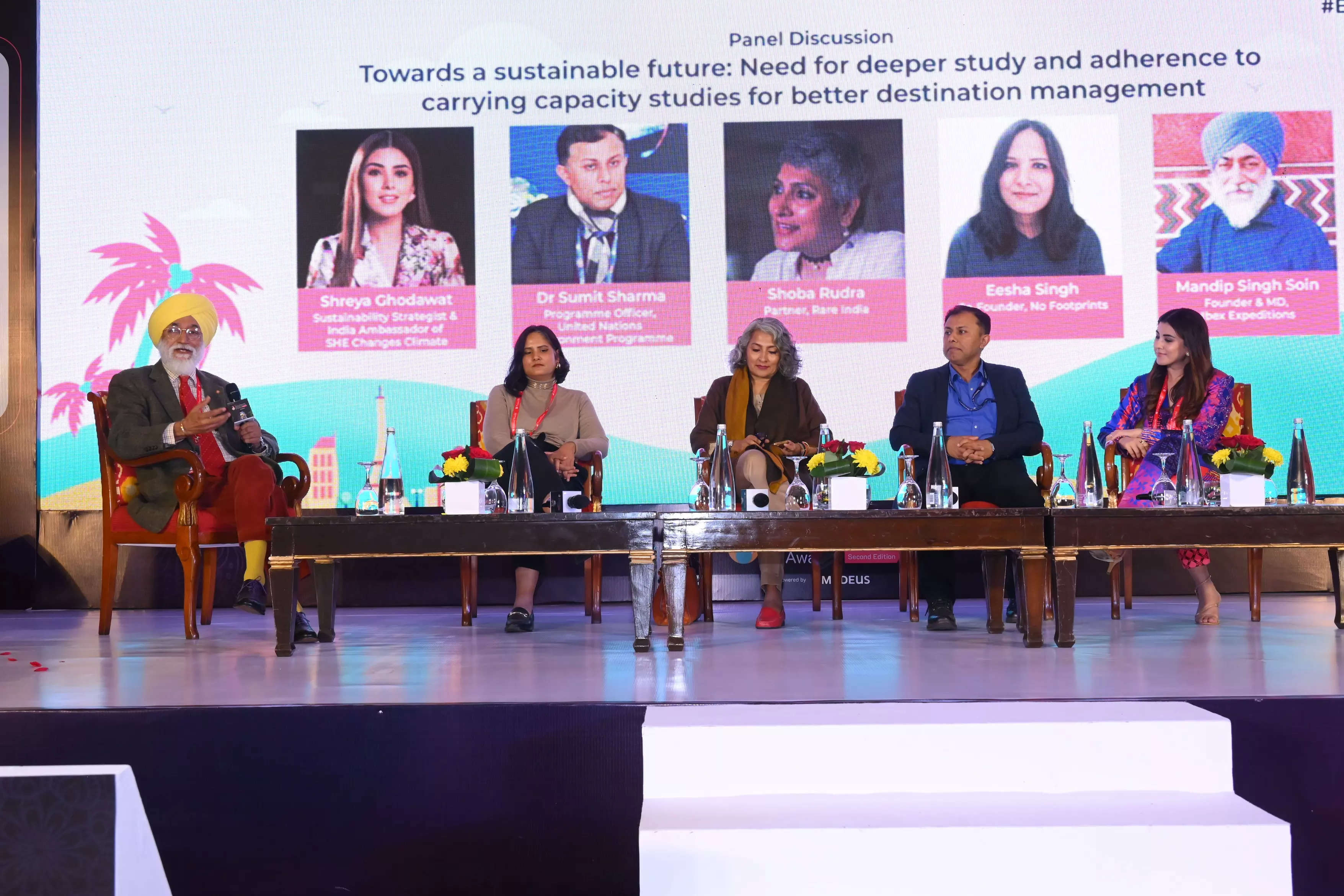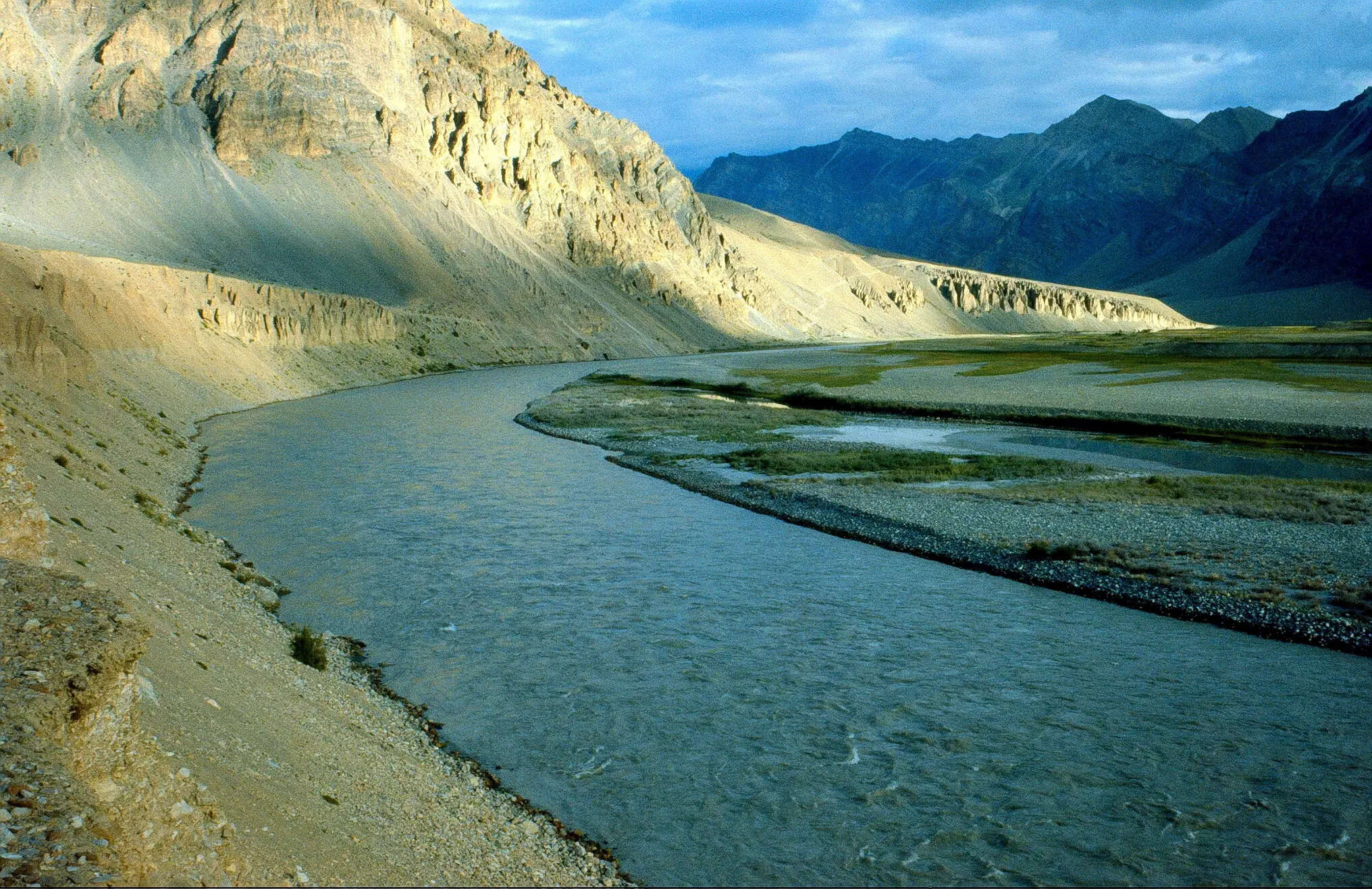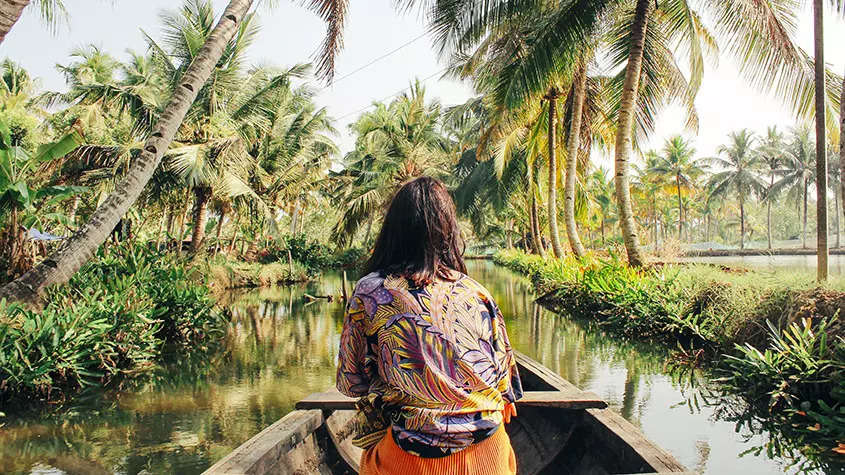
Amidst the soaring global travel trends and tourism growth facilitators discussed at the ET Travel & Tourism Conclave & Awards, a consortium of sustainability and responsible tourism experts gathered on a panel, carving out suggestions for a sustainable future of travel and tourism in India. Need for deeper study, embedding local and culture experiences, and taking up the responsible traveller guidelines while adhering to carrying capacity studies for better destination management were a few of the many discussion points that ignited a fiery call for immediate action in the tourism sector.Leading the charge was Mandip Singh Soin, the Founder & MD of Ibex Expeditions and founding President of RTSOI, a pioneer who has been upholding responsible tourism practices throughout his 43 years of experience in the sector. The core of tourism’s future lies in sustainability, he shared, setting the tone for the discussion.
Recognising the need for change within the tourism sector, Soin expressed that organisations like PATA have pioneered sustainability efforts, contrasting them with associations merely paying lip service to the cause.
Acknowledging the progress made in sustainable tourism in collaboration with the Ministry of Tourism and various state governments, Soin admitted there’s still considerable ground to cover.
“We have persistently advocated for this, and now, I’m hopeful that it will transition from mere documentation to practical implementation. Our plea was straightforward: before state governments receive funds from the Ministry of Tourism for state tourism development, we urged them to present a comprehensive tourism plan, encompassing carrying capacity assessments, as well as allocating specific funds for site studies. With cooperation from state governments, this initiative could potentially pave the way for a more sustainable future in various destinations,” he shared.
However, beyond these efforts lie a pressing need to address carrying capacity and the challenges of over tourism, shared Soin, adding that dipsticks on overloaded tourism destinations which have visibly faced challenges will play a major role. These efforts, he said, also underline the need for increased industry involvement in championing responsible tourism practices.
“It’s imperative to shift our mindset from prioritising customers above all else to prioritising the environment. Our policies and actions should align with this shift in focus,” he said, throwing open the dias to other panellists for their suggestions.
Transitioning from traditional city tours to immersive experiences
Soin’s rallying cry was echoed by Eesha Singh, Co-Founder of No Footprints, who advocated for a radical shift in the traditional narrative of city tours. “Conventional city tours lack cohesive narrative and have long been about cramming monuments into itineraries without meaningful connections,” Singh asserted, urging for a paradigm shift towards immersive experiences rooted in local narratives.
“The problem isn’t just about over tourism; it’s about neglecting the essence of travel, missing out on diverse elements that truly matter,” Eesha stressed. She advocated for including other facets, focusing not just on the right way to travel but also on the enjoyment and depth of experiences. She expressed concern that without measuring the involvement of local communities, engaging with them or highlighting destinations positively, there’d be minimal incentive for a shift from the monotonous monument-centric tours.
“If our key performance indicators also fail to prioritise aspects like carrying capacity, local community involvement, and portraying destinations positively, there’s minimal motivation for ground-level change. We’ll persist in the same conventional tourism patterns, focusing solely on financial gains. However, our destinations offer much more potential beyond the current norm. Take our ‘Mumbai by Dawn’ tour as an example—it began as a deeply cultural exploration, showcasing communities rivalling iconic monuments like the Taj Mahal,” she said.
She further pointed out a rise in conscious consumerism, indicating a growing appreciation for destination knowledge.“Let’s offer travellers context—details about what locals prefer and what defines the essence of a destination,” Singh urged.
Industry must think beyond trends, prioritise sustainability & go back to neglected spots
Painting a picture of the Indian tourism industry’s struggle with sustainability, innovation, and the impact on destinations, Shoba Rudra, Partner at Rare India articulated her concerns about the industry’s cycle of creation and depletion of destinations, highlighting the need for a conscious shift in approach.
“As an industry, we’re an unaware audience,” she reflected. She emphasised the industry’s tendency to replicate successful ventures without fostering fresh ideas, ultimately saturating markets, and neglecting sustainability. Rudra underscored the critical need for a broader perspective on innovation and awareness, urging the industry to think beyond superficial trends and prioritise sustainable practices.
She challenged the industry’s status quo, questioning the audience’s awareness and decision-making. “Are we truly conscious of our actions?” Rudra queried. “The industry’s inability to self-regulate is leading to the ruination of one destination after another,” she expressed.
“We’re transforming pristine destinations into overwhelmed hotspots,” Rudra lamented. “Places like Ladakh, once untouched, have succumbed to overdevelopment. The relentless pursuit of growth without considering carrying capacities threatens these beautiful locales.”
She delved deeper, citing the plight of once-thriving destinations now struggling due to unsustainable tourism practices. “Pushkar, once a gem, now suffers due to haphazard development and neglect,” she mentioned.
Rudra further stressed the need for a paradigm shift, urging stakeholders to reassess their role in preserving destinations. “We must redirect our efforts, reviving these neglected spots rather than continuously seeking new destinations to exploit.”
Inclusive approach for regenerative tourism needed
Also speaking on the panel, Shreya Ghodawat, a Sustainability Strategist and India Ambassador of SHE Changes Climate, highlighted the imperative need for a comprehensive approach to sustainable tourism. She emphasised the concept of ‘degrowth’ in the context of tourism, advocating a balance between economic expansion and ecological limitations.
“We’re witnessing the consequences of unsustainable growth on a finite planet,” Ghodawat stated, stressing the need for regenerative tourism practices, which allows tourist destinations time to recover after visitation.
“This is crucial since over-tourism to these places impedes this healing process,” she added, saying that this concept jeopardises the very destinations we aim to cherish.
Ghodawat also underscored the role of social media in influencing travel choices and behaviours. “Media narratives shape our travel decisions. Promoting sustainable practices like carrying reusable bottles or endorsing slow, conscious travel through these platforms is vital,” she asserted.
Further highlighting the necessity for inclusive decision-making, Ghodawat urged for diverse representation in policy formulation. “All stakeholders—be it academics, policymakers, travellers, media—must contribute. Inclusive policies should reflect on-ground realities, including studies on carrying capacity and tourists’ impact,” she emphasised.
Developing indicators for carrying capacity studies with pvt sector collab crucial
Drawing attention to the impact on tourism destinations, Dr Sumit Sharma, Programme Officer at the United Nations Environment Programme (UNEP) started by citing instances where environmental degradation and climatic change has led to halted events like cricket matches due to poor air quality. Here, said Sharma, the concept of carrying capacity becomes crucial-not just for local communities but also for the sustainability of a particular destination.
“It’s imperative to protect the essence and beauty of these tourist spots, ensuring that their sustainability never reaches a tipping point,” Sharma emphasised. He urged for a strategic collaboration between the private sector and environmental organisations to develop and adhere to robust indicators that define and maintain a destination’s carrying capacity.
He also pinned up the critical need for immediate action to address the deteriorating condition of India’s rivers and marine environments. Speaking on the panel, Sharma highlighted the alarming reality of water quality in the country’s rivers, noting that over 60 per cent fail to meet national standards and lag considerably behind WHO standards.
“Most of our rivers fall within the lower categories when it comes to water quality, signifying a grave concern for the health of these vital resources.”
Sharma also encouraged industry members to engage with the Global Tourism Plastics Initiative initiated by UNEP, which offers strategies not only for preserving monuments, keeping them away from plastic waste and carrying capacity but also for reducing operational costs.
[ad_2]
Source link

In an effort to bolster adventure tourism and tap into the potential of the region, the Directorate of Tourism, Jammu, is inviting expressions of interest (EOI) from trekking experts to improve the adventure tourism experience for visitors.
According to Vivekanand Rai, the Director of Tourism Jammu, the departments has been holding extensive consultations with experts to bring in more engaging products that would attract more people to adventure tourism.
This collaborative approach has yielded a feasibility report, with a special focus on expanding adventure activities with minimal investment. “The primary aim of this is to create job opportunities and engage the region’s youth in the flourishing tourism sector,” said Rai, adding that Jammu holds exciting possibilities as a hub for adventure tourism, particularly with the interests of the youth.
The Directorate of Tourism, Jammu, plans to host international paragliders on a FAM (Familiarisation) tour and paragliding event in Jammu. The paragliders will offer recommendations after their trials. The introduction of paddle boating at Gatha has garnered a positive response, as per the directorate. Also, the plans are in place to conduct a Paragliding Professional Training Course in Arunachal Pradesh. For this, 38 new trekking routes have been identified to enhance adventure tourism offerings in the region.
Additionally, in collaboration with the Indian Kayaking & Canoeing Association (IKCA) and Jammu Adventure Sports Association (JASA), the Directorate of Tourism, Jammu, has conducted water surveys across all districts of the Jammu Division. These surveys have led to recommendations for specific locations for various adventure activities. As per the directorate, the notable locations and activities include Paragliding at Aitham, Dhanwa, Billo ki Paudi, and Mokhri; Water-based activities at Jammu (Kattal – Battal) including shikara rides, flatwater rafting, kayaking, and more. Besides, Surinsar and Mansar Lake (Samba) offer similar adventure water sports and also, whitewater adventures can be done at Doda (Prem Nagar – Doda).
Additionally, the directorate of tourism has put focus on Ramban’s Bhagliar dam backwaters, Shiv Mandir – Karara/Kundal, Sanasar Lake, Reasi (Chenab), Baradari and Serli Pond (Katra), Udhampur (Dalsar Lake), Poonch (Buffliaz town to Poonch), and the Rajouri region (Tawi from Rajouri to Hidayatpura) which provide various adventurous experiences.
[ad_2]
Source link

In continuation of its G20 Think Tank Workshop Series, NITI Aayog organised a significant workshop titled “Implementing Goa Roadmap for Tourism” on November 4, 2023. This event, held in collaboration with India Foundation and the Ministry of Tourism, Government of India, served as a platform for experts and stakeholders to deliberate on the plan for sustainable tourism development in Goa.
The discussions at the workshop revolved around a plethora of issues, opportunities, and challenges that currently confront the sustainable development of the tourism sector in India. One prevailing theme that emerged was the vital role played by local tourism in generating income and uplifting the cultural heritage of the region.
Participants emphasised the importance of local tourism in developing sustainable tourism circuits, thereby fostering economic growth while ensuring environmental conservation.
One of the primary concerns voiced during the workshop was the need to strike a balance between increasing visitor capacity at tourist destinations and the commitment to environmental protection, green tourism practices, and sustainability. This delicate equilibrium was recognized as pivotal in preserving the natural beauty and cultural richness of the region.
The workshop also shed light on critical issues and action points derived from the Goa Roadmap, highlighting the challenges and opportunities brought about by the digital revolution and the growing necessity for environmental stewardship. It concluded with a collective goal to carry forward the spirit of the Goa Roadmap, promoting collective action and shared responsibility in building a tourism sector that can sustainably support both the planet and its people.
The outcome of this workshop, as highlighted in an officially issued statement, will be an essential document that outlines the way forward for implementing the Goa Roadmap for Tourism within the context of India.
The Goa Roadmap itself was finalised during the concluding meeting of the G20 Tourism Working Group in Goa on June 21, 2023, culminating in the Goa Declaration. The Goa Roadmap is seen as a pioneering effort to harness tourism as a driving force to achieve the Sustainable Development Goals (SDGs), a sentiment supported by the G20 New Delhi Leader’s Declaration (NDLD), which recognised the Goa Roadmap for Tourism and the ‘Travel for LiFE’ program as policy blueprints for leveraging tourism for sustainable socio-economic development.
The workshop was structured around four thematic sessions, with V. Vidyavathi, Secretary of the Ministry of Tourism, Government of India, delivering the address during the plenary session. Suman Bery, Vice Chairman of NITI Aayog, presided over the workshop and provided insights into the importance of gender-led development in the tourism sector.
He emphasised the contemporary challenges related to the dispersion of tourism and the potential solutions that could arise from collaborative efforts between the private and public sectors.
The thematic sessions explored various topics, including “Green tourism” with a focus on making the tourism sector more sustainable, responsible, and resilient. Another session concentrated on “Tourism micro-, small, and medium-sized enterprises (MSMEs)” and the role of these enterprises, startups, and the private sector in fostering innovation and dynamism within the tourism sector. “Digitalisation” was another critical theme, discussing the utilisation of digital technologies to enhance competitiveness, inclusion, and sustainability in the tourism sector. The final session emphasised the “Strategic management of tourist destinations,” particularly those with a focus on heritage and religious tourism.
The workshop witnessed the participation of experts from more than twenty government bodies and private institutions, including the Ministry of Environment, Forest, and Climate Change, Trade Promotion Council of India, Confederation of Indian Industry, National Council of Applied Economic Research, Indian Hotels Company Limited, Indian Venture & Alternate Capital Association, Indian School of Business, Indian Institute of Technology Kanpur, Small Industries Development Bank of India, United Service Institution of India, Jamia Millia Islamia University, MakeMyTrip, Adventure Tour Operators Association of India, and more.
[ad_2]
Source link






